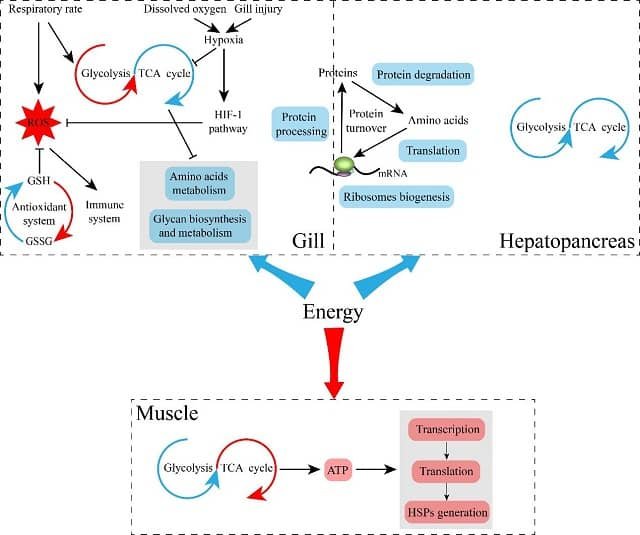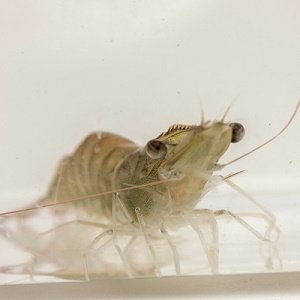by Li Yuan, Chinese Academy of Sciences
High economical values and excellent characteristics for breeding enable the Pacific white shrimp Litopenaeus vannamei to become one of the major aquaculture species in the world.

However, in summer, continuous hot weather or periodic temperatures above 35°C leads to high mortality rates of the shrimp. Therefore, it is necessary to investigate the mechanisms of L. vannamei in response to high temperature.
Recently, a research team led by Prof. LI Fuhua from the Institute of Oceanology of the Chinese Academy of Sciences (IOCAS) provided new insights into the energy reallocation strategy in L. vannamei in response to heat-stress.
The study was published in Ecotoxicology and Environmental Safety on May. 5.
Presently, most studies about heat stress were limited to single tissues or few indicators. However, the spatial network of various tissues cooperation and its relationship with energy in response to heat stress remain unclear.
In this study, the researchers conducted a comparative and sound transcriptomic analysis on three tissues of shrimp under heat stress, including hepatopancreas, gill and muscle. They found that energy-related genes were the main change genes, which inferred that energy flux might be reallocated among different tissues under heat stress.
“Understanding the cooperation of various tissues of animals in response to heat stress is the basis for clarifying the regulation mechanism of different species under heat stress,” said Dr. ZHANG Xiaoxi, first author of the study.
“We find that different tissues may cooperate with each other simultaneously via energy reallocation in response to heat stress. Less energy was channeled into protein turnover in gill and hepatopancreas for minimally life sustaining, and more energy was required for muscle to get out of adverse circumstances,” said Prof. ZHANG Xiaojun.
“This work not only provides a comprehensive understanding of the molecular mechanism of L. vannamei in response to high temperature, but also lays the foundation of mining thermotolerance genes and proposing effective strategies to cope with the high-temperature environment,” said Prof. LI.
Stay Always Informed
Join our communities to instantly receive the most important news, reports, and analysis from the aquaculture industry.
The research was supported by the National Key R&D Program of China, China Postdoctoral Science Foundation, the National Natural Science Foundation of China and China Agriculture Research System.
Contact
ZHANG Xiaoxi; LI Fuhua
Institute of Oceanology
E-mail: zhangxiaoxi@qdio.ac.cn; fhli@qdio.ac.cn
Reference (open access)
Xiaoxi Zhang, Jianbo Yuan, Xiaojun Zhang, Yang Yu, Fuhua Li. 2022. Comparative transcriptomic analysis unveils a network of energy reallocation in Litopenaeus vannamei responsive to heat-stress. Ecotoxicology and Environmental Safety, Volume 238, 2022, 113600, ISSN 0147-6513, https://doi.org/10.1016/j.ecoenv.2022.113600.
Editor at the digital magazine AquaHoy. He holds a degree in Aquaculture Biology from the National University of Santa (UNS) and a Master’s degree in Science and Innovation Management from the Polytechnic University of Valencia, with postgraduate diplomas in Business Innovation and Innovation Management. He possesses extensive experience in the aquaculture and fisheries sector, having led the Fisheries Innovation Unit of the National Program for Innovation in Fisheries and Aquaculture (PNIPA). He has served as a senior consultant in technology watch, an innovation project formulator and advisor, and a lecturer at UNS. He is a member of the Peruvian College of Biologists and was recognized by the World Aquaculture Society (WAS) in 2016 for his contribution to aquaculture.







